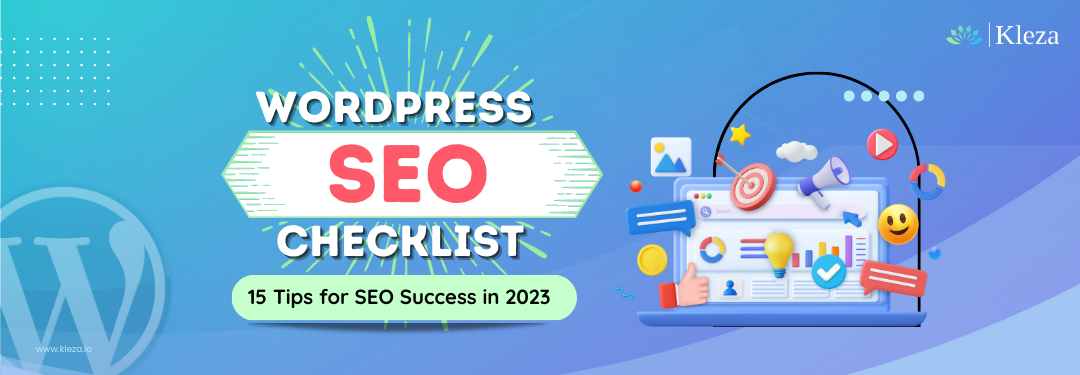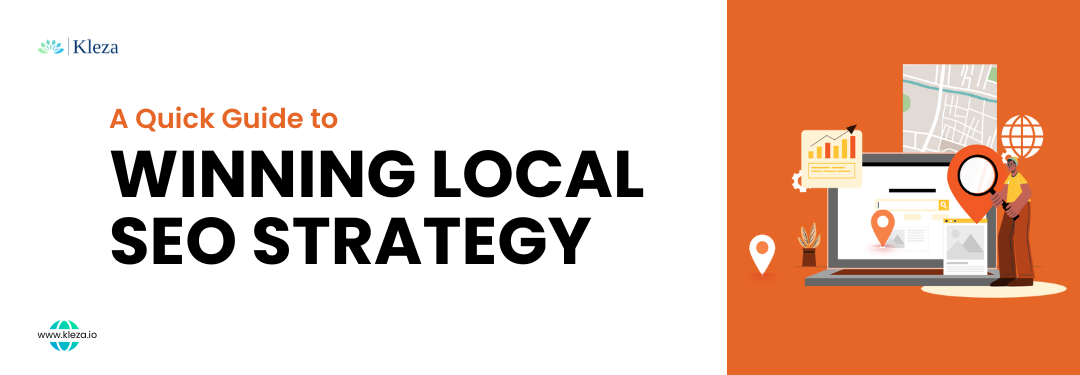
WordPress SEO Checklist – 15 Tips for SEO Success in 2024
Is your website built on WordPress? If yes, have you started optimizing it according to WordPress SEO Checklist?
With WordPress being the most preferred content management system, several businesses have shifted and built their new websites on WordPress. Among the several benefits WordPress provides, optimizing websites for search engines is the most effective.
In today’s world, ranking on search engines is vital as almost everyone relies on online searches before opting for a service/product. While this seems to be simpler, it can be possible only when you have your website optimized with a comprehensive WordPress SEO Checklist.
If you are unclear about where to get started, then here is our WordPress SEO Checklist! Keep reading and start optimizing to improve your website’s performance.
What is WordPress SEO?
WordPress SEO is nothing but the practice of optimizing websites with SEO techniques. This is the best way to make sites more visible on Google search results and other search engines. When this practice is done well, you can increase the quality and quantity of the traffic.
The Ultimate WordPress SEO Checklist for 2024

WordPress SEO Checklist
1. Choose a Secured Hosting Provider
Having a reliable hosting provider is crucial as it helps your website optimize for search engines. It makes your site faster, secure and maximizes the uptime of your website. There are several types of hosting providers – managed-to-host service, cloud hosting, shared web hosting service, virtual dedicated server, etc. Some of the popular website hosting service providers are WP Engine, SiteGround, Bluehost, Kinsta, etc.
2. Install SSL Certificate
Secured Sockets Layer (SSL) Certificate is important WordPress SEO Checklist. It enhances your SEO rankings and brand reputation. Having an SSL certificate helps visitors understand that your site is verified and safe from hackers. Also, according to Google, an SSL certificate is a major requirement, and it is one of the key factors for SEO ranking. Whether the website you own is for personal use or commercial use, have an SSL certificate installed to obtain the SEO benefits.
3. Find the Right Keywords
Keywords have the ability to define what your content is majorly about. When it comes to SEO, they play a key role to make the search engines understand what the content is and display your site when there is related search query. Thus, it is necessary to optimize content with keywords that people search in order to have the website rank higher on search engines.
4. Install SEO Plugins
SEO Plugins are incredibly the best way to improve web content rankings. With SEO plugins installed, you can get updates on what formatting changes are needed, and how you can optimize pages and posts to rank content on top of search engines. Some of the best SEO plugins for WordPress include Rank Math, Yoast SEO, Ahrefs, Schema, etc.
5. Improve the Website’s Load Time
Improving the load time of the website is not just a factor for user experience, it is an important factor for SEO too. When your website is more complex, it results from slower page load time. This directly affects bounce rate, user experience, revenue, and search performance. Increase site usability by improving load time to enhance rankings on search engines. Rely on website speed optimization tools to start increasing your page speed. Here are a few listed – GTmetrix, WebPageTest, Page Speed insights, etc.
6. Optimize URLs
URLs are not just small information about the webpage’s location. When they are kept simple, accurate, and relevant, they can bring more users and support search engines in understanding. If they aren’t structured as needed, they can break the website’s search engine rankings. Make sure to design and structure URLs properly to achieve SEO success. Consider using SEO tools such as Semrush, Moz Pro, BuzzStream, etc, for optimizing pages for SEO.
7. Use an SEO-Friendly Permalink Structure
Permalinks play a crucial role in making the page understandable for both search engines and visitors. Slug, which is the last part of the URL is the most important part of the permalink. Slugs need to be short and have to be included with the targeted keywords of the page to make it attractive and understandable for users and search engines. When the permalink structure isn’t as needed, it can affect your site’s organic traffic.
8. Use XML Sitemaps
Make your webpages easily found on search engines by building a good XML Sitemap. These act as your website’s roadmap helping search engines to lead all your important pages faster. The most beneficial aspect with XML Sitemap is that you can make your website rank better even if the internal linking is imperfect. In addition, when there is a new update related to content, search engines such as Google and Bing, easily access them and make the URLs crawled. Start building your sitemaps without errors by relying on SEO tools.

WordPress SEO Checklist
9. Optimize the Page Heading
If you’re looking to enhance the readability and accessibility of your web page, optimizing your headings is a must. By using headings effectively, you can structure your content in a way that makes it easier for readers to comprehend. Additionally, well-structured headings can also improve your page’s SEO, helping it rank higher in search engine results. This leads to increased engagement and lower bounce rates. To make the most of heading tags, be sure to use them consistently and correctly. Starting with only one H1 tag for the main heading of the page and using H2, H3, H4, etc. for subheadings. You can also consider using SEO tools to optimize your headings further.
10. Make the Website Responsive
Having a responsive website is a crucial factor for improving user experience and SEO rankings. A website that renders well on all devices and screen sizes enhances accessibility, navigation, and customer experience. It also contributes to faster page loading times, social shares, and better search engine rankings. In order to validate your website’s performance, you can use SEO tools such as Moz, Screaming Frog, and SEO Site Check-up, which can help you identify areas for improvement and optimize your website accordingly.
11. Verify Ownership on Google & Bing
This is an important step to get access for your site’s private search data. With Ownership verification, you are proving Google & Bing that you own the website. This verification process allows Google and Bing tools to continuously scan the site and find issues such as phishing attacks, malware, etc immediately. Get started with Google search console & Bing Webmaster Tools for verifying your site’s domain ownership.
12. Add Alt Text to Images
Alternative text (Alt text) helps in describing the functionality or purpose of the image that is available on the webpage. When a page fails to load image, alt text helps screen readers especially the ones with visual issues to read aloud. In addition, alt text also helps search engine bots in understanding the page content and ranks the image in image search. Try using SEO tools such as SEOptimer, Screaming Frog SEO Spider tool, etc., to find and update the missing alt text.
13. Add Title Tags and Meta Descriptions
Title tags, also known as SEO titles and SEO descriptions are a major factor for having your pages ranked. With perfect title tags and meta descriptions, you can help search engines and users understand what the page is about. These can significantly improve search visibility and assure better click-through rates. Ensure to follow the standard SEO character limit, i.e., 50 – 60 for the meta title and 150-160 for the meta description to avoid truncation in the search results. Get assistance from SEO tools such as SEMrush, Ahrefs, Meta Tags, etc, to build eye-catching content.
14. Start building Interlinks
Internal linking plays a crucial role in SEO by providing search engines with a clear understanding of the structure of your website and the connections between pages. This helps search engines to index your website more effectively and improve your website’s ranking. Furthermore, internal linking can enhance the user experience by guiding them to other relevant pages with valuable information.
15. Check the Website’s Visibility Settings
Website visibility is a key factor for welcoming visitors from search engines. When this isn’t achieved, your entire business goal gets affected as your brand is failing to get the needful reputation. In order to make your website visible to search engines, it is important to check your WordPress Settings. Go to “Settings” and click “Reading”. Look for the category named “Search Engine Visibility”, and uncheck it to make your website crawled and indexed by the search engines.
Get Ahead of the Competition with our SEO Checklist
Want your website ranked higher in search results? A comprehensive WordPress SEO checklist is essential for optimizing your website and staying on top of search engine rankings. SEO is a long-term strategy, and proper planning is key to achieving success.
Speed up your rankings by choosing the experts at Kleza & improve the website for search engines.
As a leading digital marketing agency, we prioritize SEO strategies for business growth. Our experienced SEO team will work closely with you to deliver maximum results. Contact us at +1 908-395-8797 to speak with an SEO strategist about optimizing your WordPress website.

